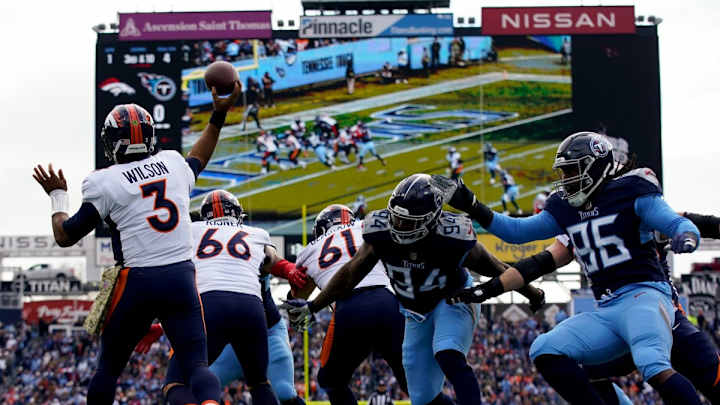Broncos' Biggest Offensive Problem is the Actual Scheme

In this story:
The Denver Broncos are 3-6 because of a historically bad offense. Only scoring 14 points per game is an indication that something is terribly wrong in the Mile High City.
There are multiple issues stymieing the Broncos' offense, one being the play-calling by Nathaniel Hackett. The play-calling is part of the problem, but the ultimate culprit encompasses all the underlying complications:
The scheme.
The Broncos' overall scheme, and the execution of it, is the root of the offense's woes.
In the offseason, Hackett explained that the Broncos would be running a variation of the West Coast Offense (WCO) and the wide zone rushing scheme. Knowing that both of those principles have provided ample success in the past, it isn’t difficult to understand why many were excited and optimistically projecting the Broncos to have a stellar offense.
However, watching the Broncos this season, there is little evidence that either of those two historically successful offenses are being used often or executed correctly. That points to Hackett’s inability to devise a good scheme based on the principles of those offenses and reflects poorly on his competency to coach said offenses.
Zone Blocking Scheme
Let's examine one of the wide zone concepts: lateral/horizontal movement by the offensive line. The key to the zone blocking scheme (ZBS) — the one Broncos Country remembers fondly from the Mike Shanahan era — whether it's inside or outside zone, is to get the defenders flowing in one direction. This can only be accomplished by the offensive linemen moving laterally.
Too often, the Broncos have plays that run straight into the middle of the defense with no lateral movement by the offensive line. This creates several issues.
First of all, it's not how the scheme is designed to work, and it creates problems because the offensive line isn't particularly built for a power scheme. The linemen aren't able to consistently win their matchups with power, and this creates a pile-up in the hole spot that the running back is running to.
It's a massive misuse of the offensive linemen’s skills. That is bad coaching.
When the Broncos do have success running the ball, it most often occurs when the offensive line is moving laterally, and the running back can cut back for significant gains. This was apparent in the latest loss to the Tennessee Titans. Several runs were bottled up quickly when the zone-blocking principles were not used.
When the ZBS principles were executed, nice gains in the run game were realized. The issue is, the lateral movement wasn't used enough.
West Coast Offense
Second, let's talk about a couple of basic principles of the WCO that are either non-existent in this Broncos scheme or implemented incorrectly. The WCO is built on timing passes, and receivers are 'schemed' open.
This Broncos offense struggles to scheme wide receivers open, and if they are open, the timing isn’t there. Hackett appears to think that the receivers should always win their matchups and get open on their own, but with the injuries, that is a foolish assumption. Furthermore, that isn't how the WCO is designed.
The receiver and the quarterback must read the correct route pre-snap, and the ball needs to be delivered to the right spot, on time, before the receiver is open. The quarterback must trust his reads and deliver quick-timing routes.
That's not happening consistently in Denver. One only needs to look at the most recent game against the Titans (again) to see that it wasn’t happening. Russell Wilson held onto the ball like it was glued to his hands and took a beating for it.
The second concept to examine is pre-snap motion. In the WCO, motion is designed to give generate matchup advantages, causing confusion in the defense, and/or getting the defense to tip its hand so the quarterback can get a better read.
Frequently, the motion the Broncos employ consists of a fake jet sweep. There is nothing wrong with this type of motion, but when it's constantly used the same way, and at the last second before the ball is snapped, the only advantage is to surprise the defense with an actual jet sweep. This particular motion is not effective as the Broncos have struggled to move the ball and have realized no advantages.
The offense that was promised is not being implemented on the field. At least not correctly. Hackett’s version of the WCO and the ZBS is a bastardization of both.
Hackett has not implemented the correct concepts, nor has he seemingly not taught those concepts well enough to be executed correctly. Denver's issues could be a combination of both failures.
Hackett’s play-calling is bad, but his scheme is worse. That's why the Broncos' offense has failed miserably.
Follow Thomas on Twitter @ThomasHallNFL.
Follow Mile High Huddle on Twitter and Facebook.
Subscribe to Mile High Huddle on YouTube for daily Broncos live-stream podcasts!

Thomas Hall has covered the Denver Broncos, NFL, and NFL Draft at Mile High Huddle since 2018. Thomas co-hosts the Mile High Insiders podcast, Orange and Blue View podcast, and Legends of Mile High. His works have been featured on CBSSports.com, 247Sports.com, and BleacherReport.com.
Follow ThomasHallNFL